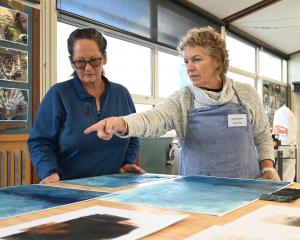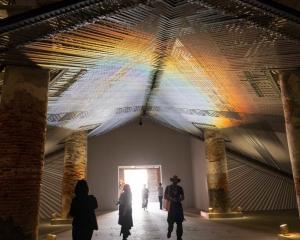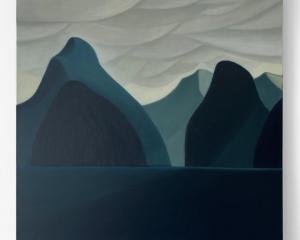Lara MacGregor's ''uber'' personal goal is to keep working towards the day when ''the arts'' get priority within New Zealand's culture.
For the past five years she has worked on this goal as artistic director of the Fortune Theatre, Dunedin's only professional theatre.
When she left earlier this week, she said goodbye as the final production for the year got under way.
She will also be leaving the security of a regular job to replenish her ''artistic pot''.
''First and foremost I'm an artist and I have to challenge myself. I want to grow as a director and performer and I also want the luxury of hindsight.
''You're supposed to keep art fresh.''
For the past five years, her job has been to develop the programme for the Fortune to find the right balance between artistic challenge and audience appreciation.
Part of that was providing ways for people who did not have theatre as part of their cultural make-up to be comfortable to come to a show, she said.
''To make theatre or art in general part of their own everyday wellbeing.''
In the past 20 years great inroads had been made from an educational standpoint, with drama now a high-school subject and one that could be majored in at university, something that was not an option when Ms Macgregor went to school and university.
''That is really encouraging. Hopefully, the translation of that back into society will see a different effect coming through.''
Another part layin show selection and while you knew comedies put bums on seats, it was not possible to offer seven comedies a year, she said.
''Pretty soon, if you do seven comedies in a year, people are going to stop coming. There are other people in society who like to be challenged more, like to cry a bit, like to have a mirror held up to their nature, so to speak.''
She realised it was challenging for people who would normally go to the theatre for a comedy to go for a drama, but she encouraged people to ''switch it up a bit and try something new or different''.
It had always been her goal for the Fortune to offer consistently good-quality productions.
''Regardless of whether you like the story or not, you could feel proud of the quality of the productions coming through and there was something you could enjoy on some level.''
She had found the process to be a ''playground'' where she was able to try things out with the support of the Fortune's board.
''To be honest, the only way was up for me, as there hadn't been an artistic director for years. I had the luxury of being able to try things.''
The two musicals Avenue Q and Altar Boyz were big-cost shows and a challenge for a company like the Fortune, she said.
She had also wanted to make sure the Fortune was back on the New Zealand arts map, given it was one of the major and oldest theatres in the country.
It appeared she had been successful, especially as people were calling the Fortune looking for work.
''From an arts sector perspective, we are succeeding and they're still willing to come, to fly the distance.''
That had been highlighted by Jeff Szusterman and Jacque Drew deciding to uproot their family from Auckland to come to Dunedin for weeks for Time Stands Still.
''They did that because they believe in the play and know the Fortune. Things like that say a lot.''
The Fortune was also lucky it had a strong base of professional actors to call on as well as bringing in actors from other centres.
''Yes, the challenge for us is, financially, we have to provide accommodation supplement for those actors coming from out of town.''
The number of local versus visiting actors was carefully considered for each play, although some plays, such as the upcoming work Flagons and Foxtrots, came with special challenges.
''It needs three young actors in their 20s. They have to be able, between them, to play piano, drums and keyboard and act and sing, and two have to look like brothers.
''When trying to figure that out, how to make that work; there are not too many actors of that calibre in town who can do all those things, and look like brothers.''
The past five years had taught her a lot and opened many doors, she said.
The role had enabled her to communicate with people from all round the world, such as Time Stands Still author Donald Margulies when Macgregor was in New York this year and Sarah Ruhl, who wrote In the Next Room (or The Vibrator Play).
''That community is really small but significant.''
There was the perpetual challenge of working in the not-for-profit sector where funding was not growing.
''It's a challenge in the way you have to be creative with that [limited budget], just as much as the work you do.''
Added to that was the requirement to be operating at capacity at all times, as there were always deadlines to meet.
''Operating at that kind of pressure can take its toll on people.
''You have to try to find the balance, as there is no let-up.''
Some of her favourite productions included Red, The Caretaker, Play and Punk Rock.
A ''crazy''highlight was the 86-hour Shakespeare Festival the Fortune put on earlier this year.
Other highlights were working with the community at such an integrated level, she said.
Developing relationships with the high school pupils who came through the ambassador programme and collaboration with the university was great.
''Just the really wonderful creative people I get to work with every day, and that's not just the people who work here, although they are. The more you give to it, the more it takes.''
Although she was leaving the job, she had planned next year's programme to give the board time to appoint a new artistic director and give the new person time to settle in.
''It's solid enough to give someone a launching pad.''
One of the shows was a collaboration between the Fortune and Court theatres.
The show would have its second season in Dunedin.
''I will be directing that show up in Christchurch and Peter King, our designer here, is going up to design it in Christchurch.''
She was not too worried about going back to freelance work, as she had operated for many years that way before the Fortune and was committed to keeping Dunedin her home base.
''I'm kind of excited to see what happens.''
Relationships and contacts meant she was not going into an unknown world.
''I've already got three months' work from January to March next year and aside from directing and acting, I'm also an avid photographer, so I'm trying to feed that in a freelance avenue. That is kind of exciting too.''
And while she thought she would have a couple of months off before starting work again, she had already agreed to be on the selection panel for the Fringe Festival and to direct a workshop in Auckland.
''What is great about that is I can say yes to those projects and not be burdened with the stress of juggling nine projects at once.
''Here you don't just direct a show, you're planning nine shows for next year, you're casting; there is no downtime.''
That said, she had already extended her departure by a few days so she could take part in the early rehearsals for the Fortune's next production.
''It didn't seem right to leave on Friday and we have rehearsal on Monday and I'm not there.''












